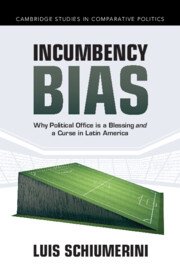Book contents
- Frontmatter
- Dedication
- Contents
- Figures
- Tables
- Acknowledgments
- 1 The Puzzle of Incumbency Bias
- 2 Bounded Accountability
- 3 Too Big to Succeed
- 4 Commodity Shocks and Incumbency Disadvantage in Rural Brazil
- 5 When Capacity Meets Authority
- 6 With Narrow Scope Comes Great Advantage
- 7 Microfoundations of Incumbency Bias
- 8 Incumbency Bias and Democracy
- Appendices
- References
- Index
- Cambridge Studies in Comparative Politics
8 - Incumbency Bias and Democracy
Published online by Cambridge University Press: 17 May 2025
- Frontmatter
- Dedication
- Contents
- Figures
- Tables
- Acknowledgments
- 1 The Puzzle of Incumbency Bias
- 2 Bounded Accountability
- 3 Too Big to Succeed
- 4 Commodity Shocks and Incumbency Disadvantage in Rural Brazil
- 5 When Capacity Meets Authority
- 6 With Narrow Scope Comes Great Advantage
- 7 Microfoundations of Incumbency Bias
- 8 Incumbency Bias and Democracy
- Appendices
- References
- Index
- Cambridge Studies in Comparative Politics
Summary
The concluding chapter summarizes the book’s argument and findings and describes its key contributions. It then turns to discuss potential theoretical limitations that pertain to the strategic behavior by citizens and incumbents, and potential scope conditions for the theory’s ability to explain incumbency bias in presidential and legislative elections. The chapter also examines the normative implications of the book’s main findings for the state of democracy in Latin America and the developing world more broadly. The chapter closes by touching on the book’s policy implications. Taken together, these findings challenge the conventional wisdom that incumbency bias is a form of failed accountability in which clientelism insulates officeholders from electoral control, or that corruption deprives citizens of the ability to select good representatives.The book instead suggests that incumbency bias is the natural result of properly functioning electoral accountability institutions in settings where citizens have low-quality information. While no panacea, the findings suggest that enhancing the quality of democracy requires improving institutional design and citizens’ knowledge.
Keywords
Information
- Type
- Chapter
- Information
- Incumbency BiasWhy Political Office is a Blessing and a Curse in Latin America, pp. 191 - 214Publisher: Cambridge University PressPrint publication year: 2025
